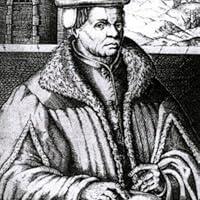
Thomas Müntzer
Over de Auteur
Thomas Müntzer was a significant figure in the German Reformation, known for his radical theological views and political activism. Born in 1490, he became a priest and was deeply influenced by the early Reformation ideas of Martin Luther, though he eventually diverged from Luther's teachings. Müntzer's sermons and writings promoted social justice and the rights of the common people, emphasizing the need for a direct relationship with God and a break from the established church's authority. His most notable works include the 'Sermon to the Princes,' where he called upon the ruling class to support the oppressed and enact reform.
Müntzer's revolutionary ideas led him to become a leader during the Peasants' War in Germany, where he rallied support for the oppressed peasants against the nobility. His passionate advocacy for the poor and his belief in a divine mandate for social change left a lasting impact on the Reformation movement. However, his radical stance eventually led to his capture and execution in 1525. Despite his tragic end, Müntzer's legacy continues to inspire discussions about social justice and reform in religious contexts.